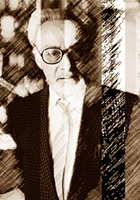Primo Levi
Primo Levi Poems
You who live secure
In your warm houses
Who return at evening to find
Hot food and friendly faces:
...
In the brutal nights we used to dream
Dense violent dreams,
Dreamed with soul and body:
To return; to eat; to tell the story.
...
Dear friends, and here I say friends
the broad sense of the word:
Wife, sister, associates, relatives,
Schoolmates of both sexes,
...
Primo Levi Biography
Primo Levi was born in Turin in Italy in 1919, to a family of non-religious Jews with Spanish roots. Pursuing an education in chemistry, he flouted Mussolini's racial laws of 1938, which prohibited Jews from higher education. Levi received his Bachelor of Science degree from the University of Turin in 1941. He eventually landed a position in a pharmaceutical laboratory where he worked until 1943, when the Germans invaded Northern Italy. Leaving his job, the young chemist traded his glassware for a pistol, joining a band of partisans devoted to fighting Germans and Italian fascists. After being betrayed by one of their own number, Levi was handed over to the Germans and deported to the Nazi concentration camp at Auschwitz. He spent 10 months at Auschwitz, where he survived by working in a synthetic rubber factory in the Monowitz labor section of the camp. Falling ill to scarlet fever, he was left behind when the Germans evacuated the camp in anticipation of advancing Russian forces. Levi's harrowing experiences in Auschwitz are the source of an insuppressible sense of wonder present in his work, a wonder over every detail of the animate and inanimate world, coupled with a profound appreciation of simply being alive to observe the details. In January 1945, Levi was liberated by the Red Guard. Making his way back to Milan, he married Lucia and resumed his career as an industrial chemist. In 1977, he retired from his position as manager of a chemical factory in Turin, devoting himself exclusively to writing until his controversial death on April 11, 1987, in the apartment building where he was born and eventually took up residence. Falling to his death from the railing of his third-floor stairwell, the question of whether Levi committed suicide or was the victim of a tragic accident is still open to debate.)
The Best Poem Of Primo Levi
Shema
You who live secure
In your warm houses
Who return at evening to find
Hot food and friendly faces:
Consider whether this is a man,
Who labours in the mud
Who knows no peace
Who fights for a crust of bread
Who dies at a yes or a no.
Consider whether this is a woman,
Without hair or name
With no more strength to remember
Eyes empty and womb cold
As a frog in winter.
Consider that this has been:
I commend these words to you.
Engrave them on your hearts
When you are in your house, when you walk on your way,
When you go to bed, when you rise.
Repeat them to your children.
Or may your house crumble,
Disease render you powerless,
Your offspring avert their faces from you.
Translated by Ruth Feldman And Brian Swann
Anonymous submission.
Primo Levi Comments
Primo Levi Quotes
Anyone who has obeyed nature by transmitting a piece of gossip experiences the explosive relief that accompanies the satisfying of a primary need.
The bond between a man and his profession is similar to that which ties him to his country; it is just as complex, often ambivalent, and in general it is understood completely only when it is broken: by exile or emigration in the case of one's country, by retirement in the case of a trade or profession.
I live in my house as I live inside my skin: I know more beautiful, more ample, more sturdy and more picturesque skins: but it would seem to me unnatural to exchange them for mine.
The aims of life are the best defense against death.
Human memory is a marvelous but fallacious instrument.... The memories which lie within us are not carved in stone; not only do they tend to become erased as the years go by, but often they change, or even increase by incorporating extraneous features.

_________ GET UP! We used to dream in those brutal nights Dense, violent dreams Dreamed with soul and body: To return; to eat; to tell our story. Until it sounded - brief, low The command of dawn: Wstawac ''; And the heart cracked in the chest. Now we've recovered our homes, Our bellies are full, We've just finished telling the story. It's time. Soon we'll hear again That foreign command: Wstawac ''. - - ALZARSI Sognavamo nelle notti feroci Sogni densi e violenti Sognati con anima e corpo: Tornare; mangiare; raccontare. Finché suonava breve sommesso Il comando dell’alba: «Wstawac'»; E si spezzava in petto il cuore. Ora abbiamo ritrovato la casa, Il nostro ventre è sazio, Abbiamo finito di raccontare. E’ tempo. Presto udremo ancora Il comando straniero: «Wstawac'». _________